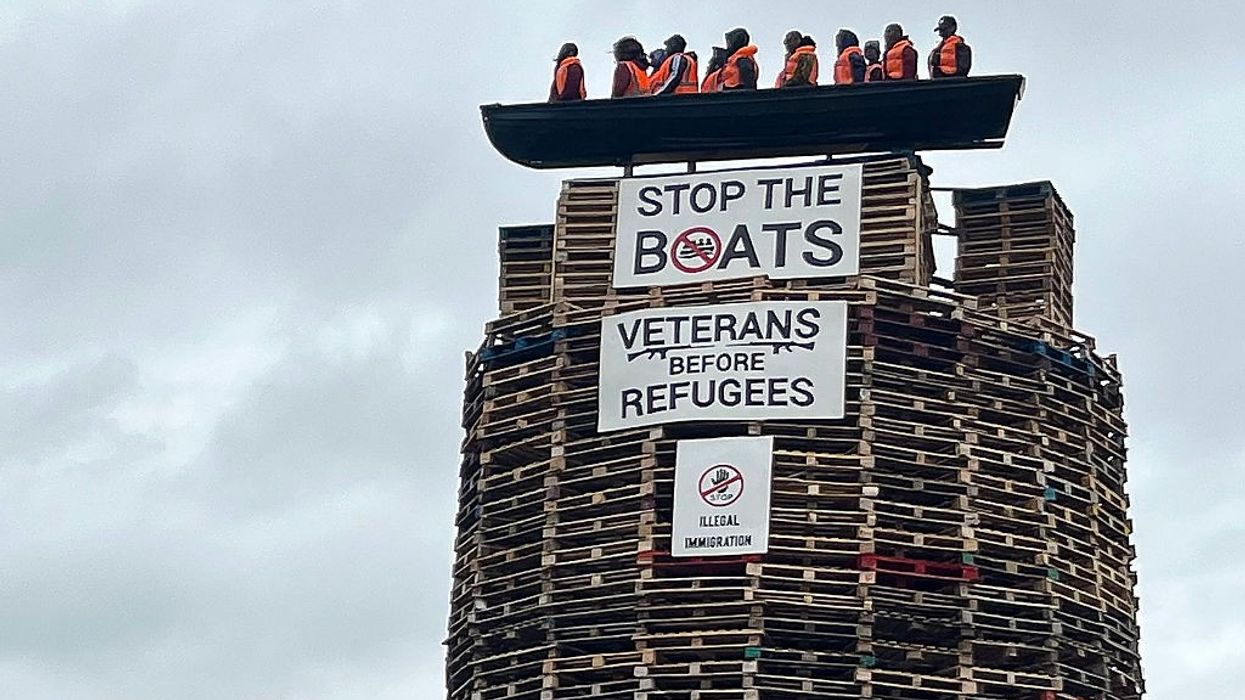POLICE in Northern Ireland have launched a hate crime investigation after a bonfire topped with effigies of migrants in a boat was set alight in the village of Moygashel, County Tyrone.
The incident, which took place on Thursday (10) night, has drawn widespread condemnation from political leaders, church officials, and human rights groups.
The Police Service of Northern Ireland (PSNI) confirmed they had received several complaints about the display and were treating it as a hate incident.
In a statement, the PSNI said, “Police have received a number of reports regarding the bonfire in Moygashel and the material that has been placed upon it. Police are investigating this hate incident.
"Police are here to help those who are or who feel vulnerable, to keep people safe. We do this by working with local communities, partners, elected representatives and other stakeholders to deliver local solutions to local problems, building confidence in policing and supporting a safe environment for people to live, work, visit and invest in Northern Ireland, but we can only do so within the legislative framework that exists."
The model at the centre of the controversy showed 12 dummies dressed in life jackets inside a dinghy placed on top of the bonfire, with a banner reading “Stop the Boats.”
An Irish tricolour flag and a separate sign reading “Veterans before Refugees,” alongside images of two guns, were also attached to the structure.

The bonfire was part of the annual July 11 and 12 celebrations held by loyalist communities to mark the victory of Protestant King William of Orange over Catholic King James II at the Battle of the Boyne in 1690.
Despite calls for its removal, the bonfire was set alight around 11pm, with a large crowd watching and filming on their phones. A pipe band played music and fireworks were set off before the fire was lit.
The display comes just weeks after attacks on migrants’ homes in nearby Ballymena, where masked rioters targeted police, homes, and cars.
Condemnation came from across the political spectrum. Sinn Féin assembly member Colm Gildernew called the act “vile and deplorable” and said it was “clearly a hate crime.”
Church of Ireland Archbishop John McDowell described the effigy as “racist, threatening and offensive,” calling it “inhuman and deeply sub-Christian.”
Social Democratic and Labour party councillor Malachy Quinn told The Irish News, “Those responsible for this hateful display claim to be celebrating British culture. Let’s be clear – racism and intimidation are not culture. This isn’t pride – it’s poison.”
Amnesty International’s Northern Ireland director Patrick Corrigan called the act “vile” and “dehumanising,” warning it fuelled hatred and racism.
Ulster Unionist party leader and Northern Ireland health minister Mike Nesbitt also condemned the display “without reservation,” calling the image “sickening” and “entirely out of step with what is supposed to be a cultural celebration.”
The Democratic Unionist party, Northern Ireland’s largest unionist party, issued a statement opposing the use of effigies or provocative symbols on bonfires, saying such acts “are not part of the cultural tradition.” The party added: “These should be positive cultural celebrations and we support those within our community who wish to celebrate their culture peacefully.”
However, prominent loyalist activist Jamie Bryson defended the bonfire display, arguing it was a form of political protest. He cited a European Court of Human Rights ruling that burning effigies could be considered “legitimate political expression.”
Bryson accused critics of hypocrisy, comparing the display to recent defences of performances by pro-unity rap group Kneecap.
In a social media post, the Moygashel Bonfire Association rejected claims of racism, saying the display was meant to protest illegal immigration. “This year’s bonfire ‘topper’ should not be seen as racist, threatening or offensive,” the group wrote. “We believe this unfettered invasion is the biggest threat to the UK since Adolf Hitler.”
This is not the first time Moygashel’s bonfires have drawn controversy. In 2024, a mock police car was burned on the same site, raising concerns in a region where police officers have historically been frequent targets.
Separately, the PSNI refused to help remove another bonfire in south Belfast earlier this week, despite safety concerns about asbestos and its proximity to an electricity substation that powers two hospitals. The police said after reviewing the risks, they decided not to intervene.
The July 12 bonfire tradition continues to be a flashpoint in Northern Ireland’s divided society, even decades after the 1998 Good Friday Agreement brought an end to most sectarian violence.
(with inputs from agencies)





